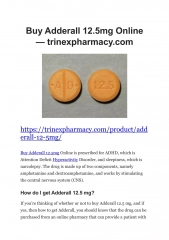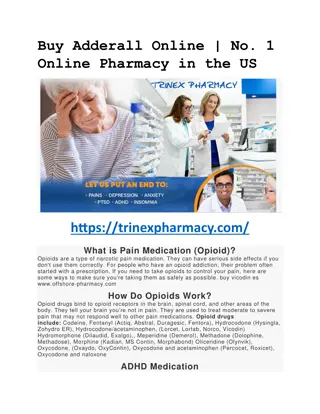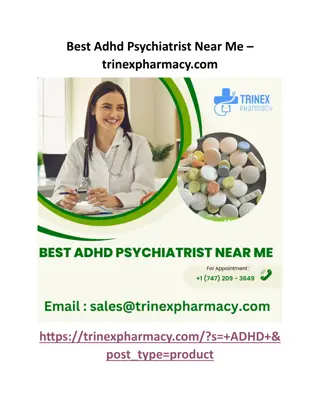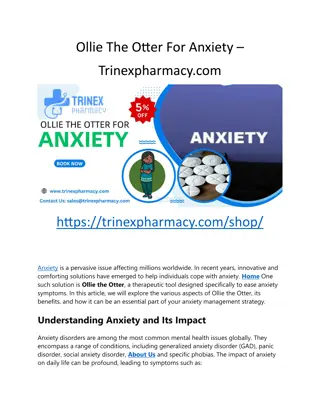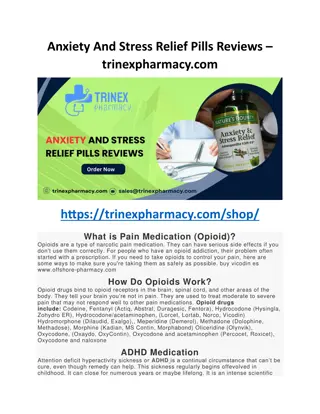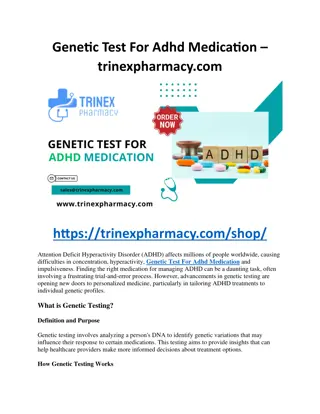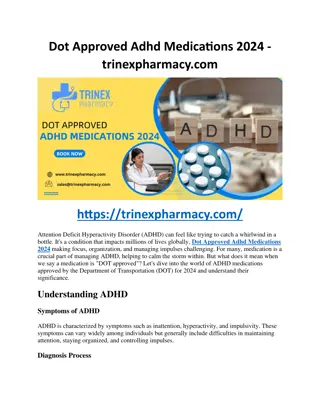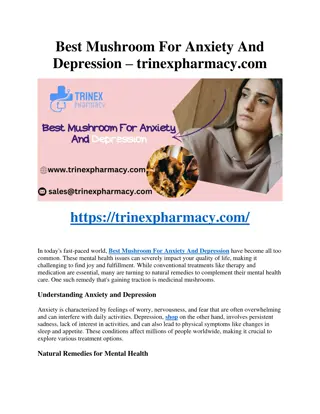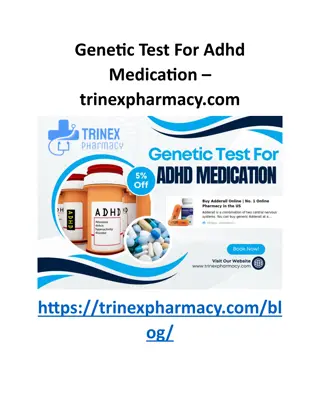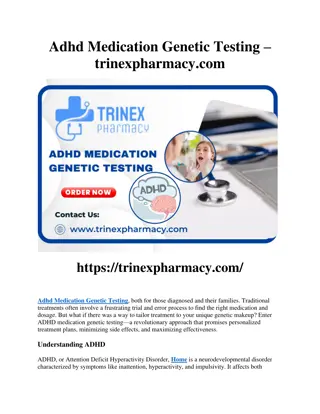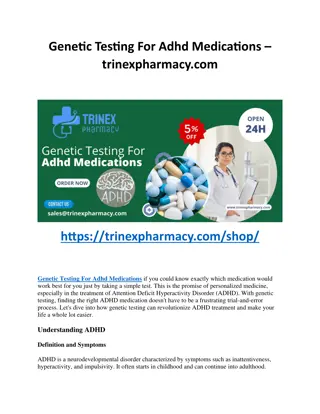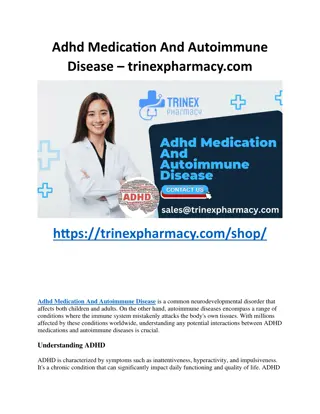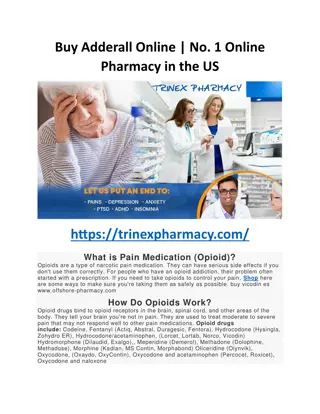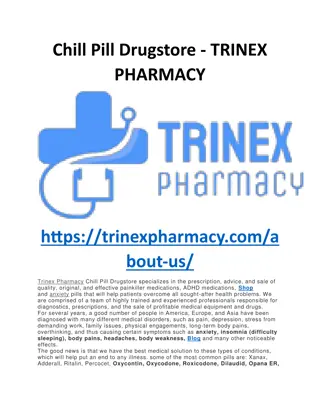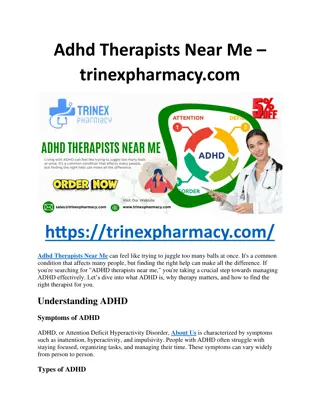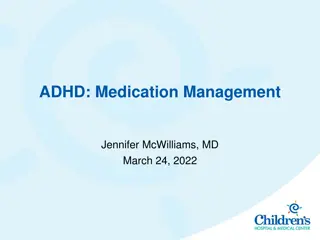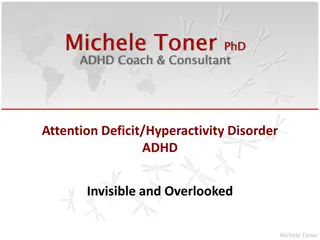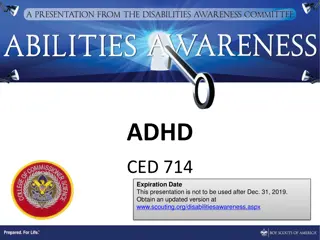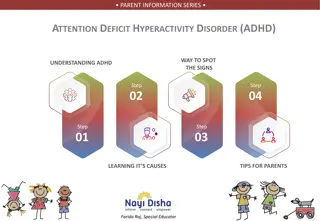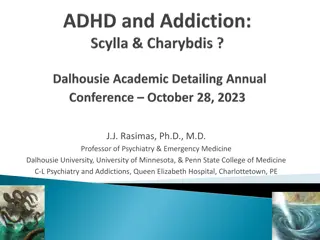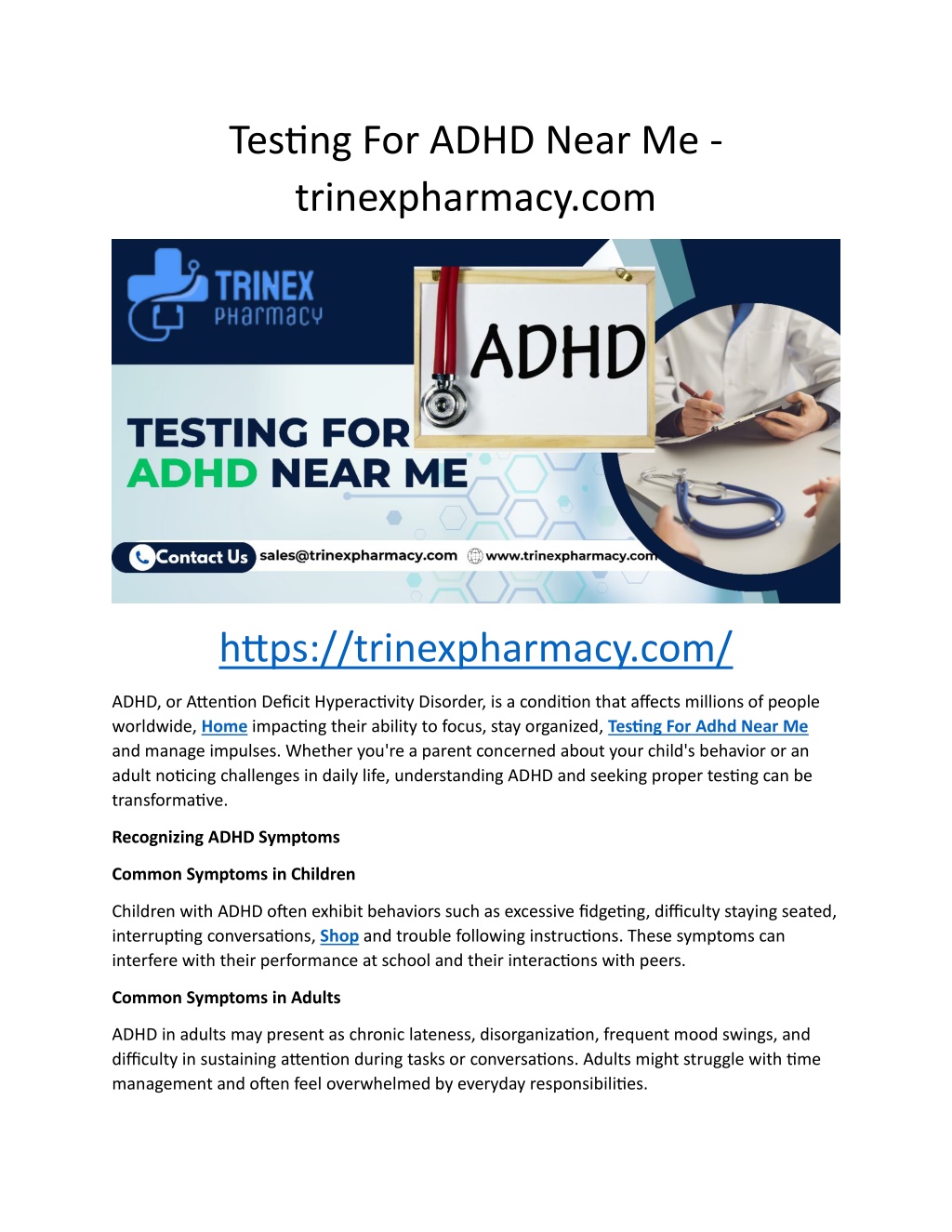
Testing For ADHD Near Me - trinexpharmacy.com
ADHD, or Attention Deficit Hyperactivity Disorder, is a condition that affects millions of people worldwide, Home impacting their ability to focus, stay organized, Testing For Adhd Near Me and manage impulses. Whether you're a parent concerned about your child's behavior or an adult noticing challenges in daily life, understanding ADHD and seeking proper testing can be transformative. Contact : 1 (747) 209 u2013 3649 E-mail : sales@trinexpharmacy.com
Download Presentation

Please find below an Image/Link to download the presentation.
The content on the website is provided AS IS for your information and personal use only. It may not be sold, licensed, or shared on other websites without obtaining consent from the author. If you encounter any issues during the download, it is possible that the publisher has removed the file from their server.
You are allowed to download the files provided on this website for personal or commercial use, subject to the condition that they are used lawfully. All files are the property of their respective owners.
The content on the website is provided AS IS for your information and personal use only. It may not be sold, licensed, or shared on other websites without obtaining consent from the author.
E N D
Presentation Transcript
Testing For ADHD Near Me - trinexpharmacy.com https://trinexpharmacy.com/ ADHD, or Attention Deficit Hyperactivity Disorder, is a condition that affects millions of people worldwide, Home impacting their ability to focus, stay organized, Testing For Adhd Near Me and manage impulses. Whether you're a parent concerned about your child's behavior or an adult noticing challenges in daily life, understanding ADHD and seeking proper testing can be transformative. Recognizing ADHD Symptoms Common Symptoms in Children Children with ADHD often exhibit behaviors such as excessive fidgeting, difficulty staying seated, interrupting conversations, Shop and trouble following instructions. These symptoms can interfere with their performance at school and their interactions with peers. Common Symptoms in Adults ADHD in adults may present as chronic lateness, disorganization, frequent mood swings, and difficulty in sustaining attention during tasks or conversations. Adults might struggle with time management and often feel overwhelmed by everyday responsibilities.
The Importance of Early Diagnosis Benefits for Children Early diagnosis in children can lead to interventions that improve their academic performance and social interactions. Understanding their condition helps in developing tailored strategies that support their learning and emotional well-being. Benefits for Adults For adults, a diagnosis can explain long-standing challenges and open doors to effective treatment options. It can lead to improved professional performance and personal relationships by addressing the root causes of their difficulties. Types of ADHD Tests Behavioral Assessments Behavioral assessments involve observing the individual's actions and interactions in different settings. These assessments provide insight into how ADHD symptoms manifest in everyday life. Psychological Testing Psychological testing includes standardized tests that measure attention, memory, and problem- solving skills. These tests help identify specific cognitive challenges associated with ADHD. Neuropsychological Testing Neuropsychological testing is more comprehensive, examining various aspects of brain function. It can provide a detailed understanding of how ADHD affects cognitive processes. Finding a Specialist Near You Types of Specialists Who Diagnose ADHD Professionals who diagnose ADHD include psychologists, psychiatrists, pediatricians, and neurologists. Each brings a different perspective and expertise to the diagnostic process. How to Search for Local Specialists Start by asking for recommendations from your primary care doctor, checking with local hospitals, or searching online directories. Reading reviews and checking credentials can help you find a reputable specialist. Preparing for the Appointment What to Expect During the Initial Consultation The initial consultation typically involves discussing your concerns, medical history, and symptoms. Be prepared to answer questions about behavior patterns and challenges faced.
Preparing Your Medical History Gather information about your medical history, including previous diagnoses, treatments, and family medical history. This background helps the specialist understand your health context. Questions to Ask the Specialist Prepare questions to ask during your appointment, such as the types of tests recommended, the diagnostic process, and potential treatment options. Being informed helps you make the most of your consultation. During the ADHD Evaluation Typical Procedures and Tests The evaluation may include interviews, questionnaires, and various cognitive tests. The specialist might also request input from teachers or family members to get a comprehensive view of symptoms. How Long Does It Take? The duration of an ADHD evaluation can vary but typically takes several hours over one or more sessions. This thorough approach ensures accurate diagnosis. What Information Will Be Collected? Information collected includes behavioral observations, test results, and personal history. This data helps in forming a complete picture of the individual's condition. Understanding Your Diagnosis Interpreting Test Results The specialist will explain the test results, highlighting areas where ADHD symptoms are most apparent. Understanding these results is crucial for developing an effective treatment plan. Next Steps After Diagnosis After diagnosis, the specialist will discuss treatment options, which may include medication, therapy, and lifestyle adjustments. Creating a comprehensive plan is essential for managing symptoms effectively. Treatment Options for ADHD Medication Medications, Shipping Policy such as stimulants and non-stimulants, can help manage ADHD symptoms. The specialist will determine the best option based on individual needs and responses.
Therapy and Counseling Therapy options include cognitive-behavioral therapy (CBT), which helps individuals develop coping strategies and improve organizational skills. Counseling can also support emotional well- being. Lifestyle Changes Lifestyle changes, such as regular exercise, Refunds & Returns Policy a healthy diet, and structured routines, can significantly impact symptom management. These changes promote overall health and well-being. Supporting a Loved One with ADHD How to Help Children Supporting a child with ADHD involves creating a structured environment, using positive reinforcement, and working closely with teachers. Understanding and patience are key to their success. Supporting Adults with ADHD For adults, support can include helping with organization, setting reminders, and encouraging the use of tools like planners. Being a source of encouragement and understanding is invaluable. Dealing with Stigma Breaking the Myths About ADHD There are many misconceptions about ADHD, FAQ such as it being just an excuse for laziness. Educating yourself and others about the realities of ADHD helps combat these myths. Building a Support Network Joining support groups and connecting with others who understand ADHD can provide emotional support and practical advice. A strong network makes managing ADHD easier. Insurance and Costs Understanding Insurance Coverage Check with your insurance provider to understand what ADHD testing and treatment are covered. Knowing your benefits can help manage costs effectively. Managing Out-of-Pocket Expenses If insurance doesn't cover all costs, Terms and Conditions look for community health centers or clinics that offer sliding scale fees. Financial planning and budgeting can also help manage expenses.
Online ADHD Testing Pros and Cons Online ADHD testing can be convenient and accessible but may lack the comprehensive evaluation of in-person testing. Use online tests as a preliminary step, not a final diagnosis. Reliable Online Resources Look for reputable sources, such as university health websites or established medical organizations, when considering online ADHD tests. Quality information is crucial for accurate self-assessment. Living with ADHD Daily Management Tips Managing ADHD involves setting routines, breaking tasks into smaller steps, and using organizational tools. Consistency and structure help in managing daily challenges. Long-term Strategies Long-term strategies include ongoing therapy, regular check-ins with healthcare providers, and adapting strategies as needed. Continual support and adaptation are key to thriving with ADHD. Conclusion Testing for ADHD can be a transformative step towards better understanding and managing the condition. Whether you're seeking help for yourself or a loved one, taking the initiative to find a specialist and undergo thorough evaluation is crucial. Embrace the journey, as early diagnosis and appropriate treatment can lead to significant improvements in quality of life. FAQs 1. What are the most common symptoms of ADHD in adults? Common symptoms in adults include chronic lateness, disorganization, difficulty sustaining attention, and frequent mood swings. 2. How do I find a specialist who can test for ADHD near me? Start by asking your primary care doctor for recommendations, checking with local hospitals, or searching online directories and reading reviews. 3. What should I bring to my ADHD evaluation appointment? Bring your medical history, a list of symptoms, any previous diagnoses or treatments, and questions you have for the specialist. 4. Are there online tests for ADHD, and are they reliable?
Online tests can be a convenient preliminary step but should not replace a comprehensive in- person evaluation. Use them as a starting point and seek professional advice. 5. What are some effective lifestyle changes for managing ADHD? Regular exercise, a healthy diet, structured routines, and the use of organizational tools like planners can significantly help in managing ADHD symptoms. Contact : +1 (747) 209 3649 E-mail : sales@trinexpharmacy.com

